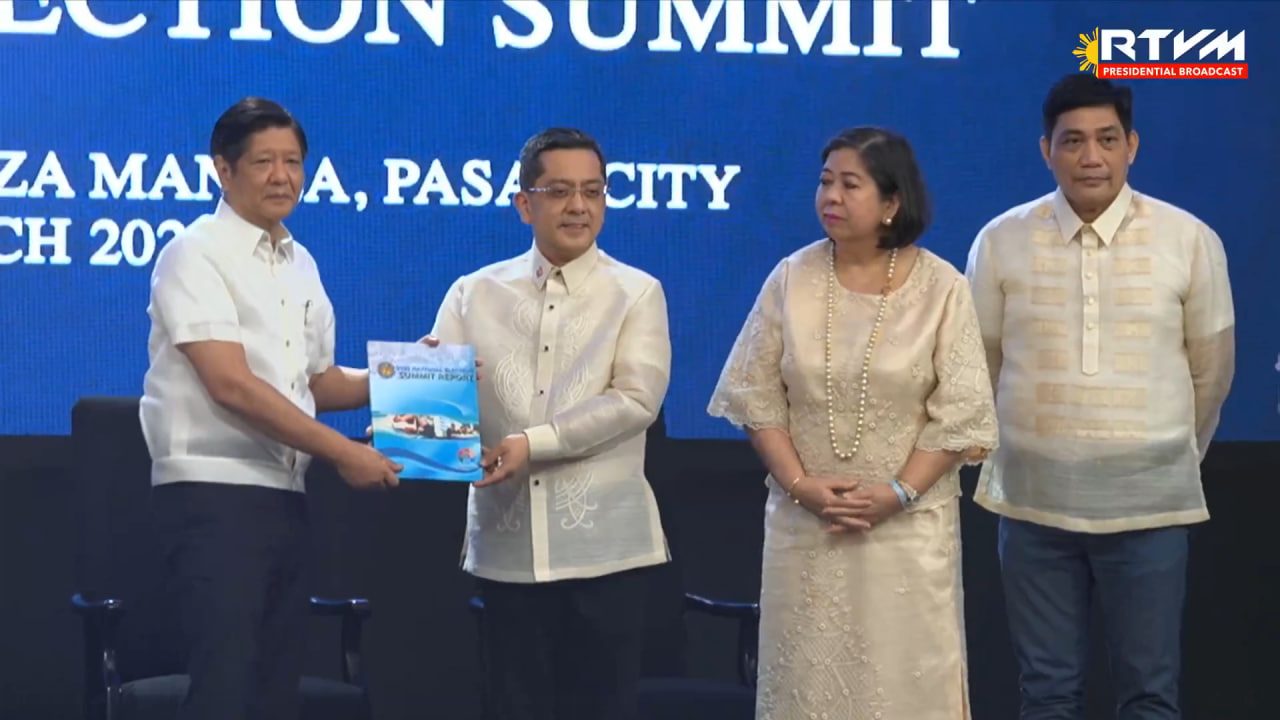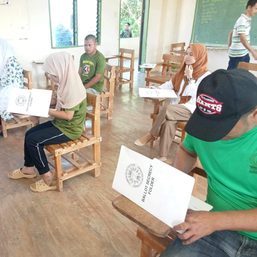SUMMARY
This is AI generated summarization, which may have errors. For context, always refer to the full article.

MANILA, Philippines – President Ferdinand Marcos Jr. on Friday, March 10, called for poll reforms in the country during a historic summit mounted by the Commission on Elections (Comelec), focusing on the need to upgrade election technology.
Two days earlier, Comelec Chairman George Garcia floated the possibility of Marcos issuing a policy direction on key election issues such as the future of aging vote-counting machines (VCMs). Marcos’ speech, however, painted in broad strokes.
“Now that we use modern technologies to advance and make our election system more reliable, I am sure that we can implement positive reforms and make election result transmission faster and maintain its accuracy,” Marcos said in his speech.
He added that there is need for technological reforms to “ensure accurate and unalterable results so as to maintain the sanctity of the polls and the people’s trust.”
In a subsequent press conference, Garcia revealed that the President had pledged his full support for the improvement of the election process in the country, particularly the upgrading of technology.
“The President told me if the machines really need to be replaced, then so be it. Let’s change the system,” Garcia said.
If the government will invest in new vote-counting machines, the Comelec would need around P6.7 billion to retire the 97,000 VCMs it owns, which are almost a decade old and have been used in three consecutive national elections already.
In the 2022 national elections, 1,310 out of the 107,345 VCMs used malfunctioned and had to be replaced on election day.
There are also numerous proposals in the 19th Congress to shift to a hybrid election system, which combines a manual counting of votes and electronic transmission of results. It remains to be seen whether that push would succeed, but time is of the essence.
“We (Comelec) will only follow what the Congress will do. We just hope that the proposed system for elections will be more user-friendly and convenient for both voters and election officers, especially our hardworking teachers who serve in this capacity,” the polling body chairman said.
Educating voters, training teachers
Marcos also encouraged discussions on other “nitty-gritty” of the country’s electoral processes.
“[These include] recalibrating the capacity of our teachers as electoral board members and integrating voter education in the curricula of K to 12, tertiary level, and the national service training program,” he said.
“So as we engage with discussions amongst our students and the Filipino youth, we likewise promote and encourage them to form and cast an informed vote as well as discerningly choose the leaders of our society,” he added.
Garcia promised that the proposed electoral reforms would be put into effect if they receive increased funding and if Congress provides legislative backing.
“Just give us the right resources, we can promise that our commission will choose a good class of technology. In terms of legislation, we are pushing for the internet voting and early voting of senior citizens, pregnant women, persons with disabilities, and indigenous people,” Garcia said in Filipino.
During the summit, which convened 400 election stakeholders from various sectors, the Comelec submitted to the President a copy of its report on policy recommendations that were finalized during the event.
“I underscore the Comelec’s critical role as the guardians of our people’s sovereign will in ensuring the integrity of the electoral process,” Marcos said.
The Comelec and the Marcoses have a long and complicated history.
In the 1986 snap elections, computer technicians hired by the Comelec walked out during the tabulation of votes after noticing that their superiors were manipulating the results in favor of deposed dictator Ferdinand E. Marcos, the father of the current president.
Marcos Jr., meanwhile, is where he is today due to many key players, including the Comelec, which dismissed all cases seeking to block his 2022 presidential bid due to his tax convictions in the 1990s.
During the campaign, the Marcos team was also on the receiving end of allegations in connection with vote-buying and disinformation, but the Comelec received no formal complaint to pursue legal action. – with reports from Dwight de Leon/Rappler.com
Add a comment
How does this make you feel?





There are no comments yet. Add your comment to start the conversation.